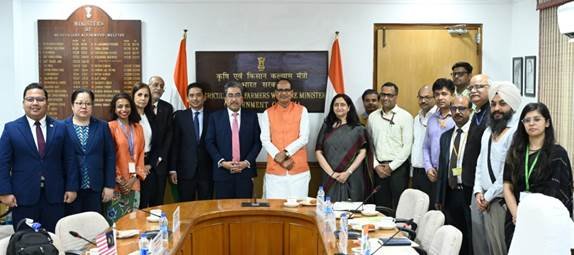Thursday, 19 February 2026

Malaysia request to India to reduce the restrictions placed on the export of certain agricultural products, such as rice and sugar during the meeting.
India and Malaysia have decided to increase cooperation between the two countries in the field of Oil palm and other sectors. This was discussed during the meeting of the Union Minister for Agriculture & Farmers Welfare and Rural Development, Shivraj Singh Chouhan and the Minister of Plantations and Commodities of Malaysia, Datuk Seri Johari Abdul Ghani. The Malaysian Minister is on a visit to India from 16-19 July 2024 and met Shivraj Singh Chouhan today at Krishi Bhawan, New Delhi to discuss opportunities to deepen the bilateral agriculture cooperation between India and Malaysia.
During the G2G meeting, Minister Johari and Shivraj Singh Chouhan explored important topics in depth. These included: maintaining consistent export policies that benefit Indian buyers; working together to tackle the issue of global food security; India’s ambitious plans to become an edible oil nation independent under the NMEO-OP; the significance of sustainable palm oil plantations; and providing ongoing assistance to fulfil India’s palm oil needs.
Minister Johari stated, “Malaysia stands ready to provide invaluable support, encouraging the growth of oil palm cultivation,” during a news conference in New Delhi. The significance of India to Malaysia’s oil palm industry is immense. Together with Minister Shivraj Singh Chouhan, I have planned a cooperative effort that will be mutually beneficial to our two countries. Achieving global food security demands and sustainability goals will also be significantly aided by this alliance.
When comparing edible oils, palm oil is among the most productive and least land-intensive. Despite accounting for just 8 per cent of the world’s arable land, oil palm trees produce 32 per cent of the world’s major seed oil. Palm oil is in a special position to efficiently satisfy the increasing worldwide demand for edible oils, which is particularly relevant given the growing number of people concerned about climate change and deforestation.
“Malaysia is deeply committed to sustainable palm oil production, adhering to stringent environmental standards and sustainable practices,” Minister Johari continued, expanding on the significance of sustainable palm oil use and cultivation. Certification under the Malaysian Sustainable Palm Oil (MSPO) programme guarantees that palm oil is made in a way that doesn’t harm local communities, biodiversity, or forests.
Malaysia requests India to reduce rice, sugar, and farm export restrictions
During the meeting, the minister Johrisaid in the statement that Malaysia request to India to reduce the restrictions placed on the export of certain agricultural products, such as rice and sugar.
In 2023, India, which is the world’s largest exporter of rice and onions and the world’s second largest exporter of sugar, implemented export restrictions on these commodities in order to maintain a level of price stability in the domestic market in advance of the general elections that were held in April and May 2020. The country of Malaysia is the second-largest exporter of palm oil to India, after Indonesia. India was a significant source of sugar, rice, and onions for Malaysia.
In light of the fact that rice stocks in the country have reached an all-time high, it is anticipated that New Delhi will reduce the floor price for basmati rice exports and replace the twenty percent export tax on parboiled rice with a fixed charge on overseas shipments, according to sources within the government.